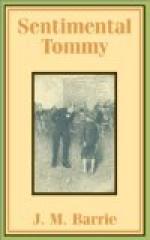She remembered something and cried joyously, “And you knew what was in my blood before you asked me, so I don’t need to tell you, do I? And you are not afraid that I shall corrupt you, are you? And you don’t think it a pity I didn’t die when I was a tiny baby, do you? Some people think so, I heard them say it.”
“What would have become of me?” was all he dared answer in words, but he drew her to him again, and when she asked if it was true, as she had heard some woman say, that in some matters men were all alike, and did what that one man had done to her mamma, he could reply solemnly, “No, it is not true; it’s a lie that has done more harm than any war in any century.”
She sat on his knee, telling him many things that had come recently to her knowledge but were not so new to him. The fall of woman was the subject, a strange topic for a girl of thirteen and a man of sixty. They don’t become wicked in a moment, he learned; if they are good to begin with, it takes quite a long time to make them bad. Her mamma was good to begin with. “I know she was good, because when she thought she was the girl she used to be, she looked sweet and said lovely things.” The way the men do is this, they put evil thoughts into the woman’s head, and say them often to her, till she gets accustomed to them, and thinks they cannot be bad when the man she loves likes them, and it is called corrupting the mind.
“And then a baby comes to them,” Grizel said softly, “and it is called a child of shame. I am a child of shame.”
He made no reply, so she looked up, and his face was very old and sad. “I am sorry too,” she whispered, but still he said nothing, and then she put her fingers on his eyes to discover if they were wet, and they were wet. And so Grizel knew that there was someone who loved her at last.
The mirror was the only article of value that Grizel took with her to her new home; everything else was rouped at the door of Double Dykes; Tommy, who should have been at his books, acting as auctioneer’s clerk for sixpence. There are houses in Thrums where you may still be told who got the bed and who the rocking-chair, and how Nether Drumgley’s wife dared him to come home without the spinet; but it is not by the sales that the roup is best remembered. Curiosity took many persons into Double Dykes that day, and in the room that had never been furnished they saw a mournful stack of empty brandy bottles, piled there by the auctioneer who had found them in every corner, beneath the bed, in presses, in boxes, whither they had been thrust by Grizel’s mamma, as if to conceal their number from herself. The counting of these bottles was a labor, but it is not even by them that the roup is remembered. Among them some sacrilegious hands found a bundle of papers with a sad blue ribbon round them. They were the Painted Lady’s love-letters, the letters she had written to the man. Why or how they had come back to her no one knew.




